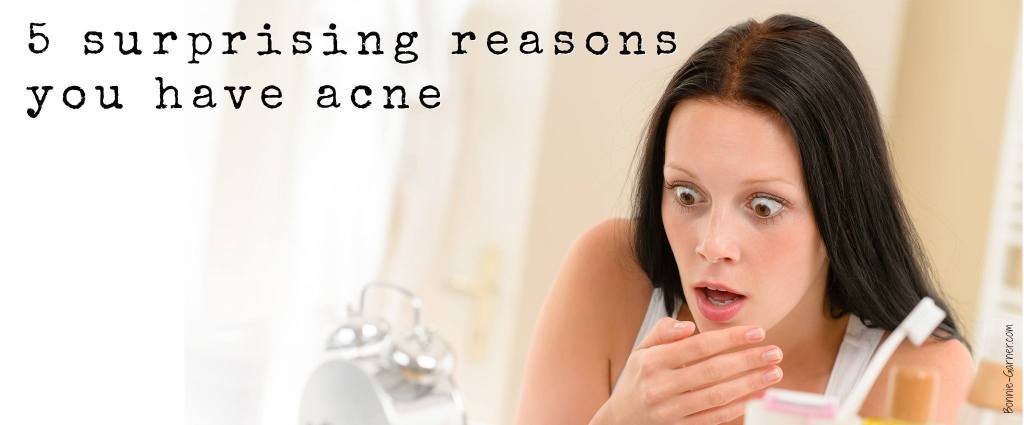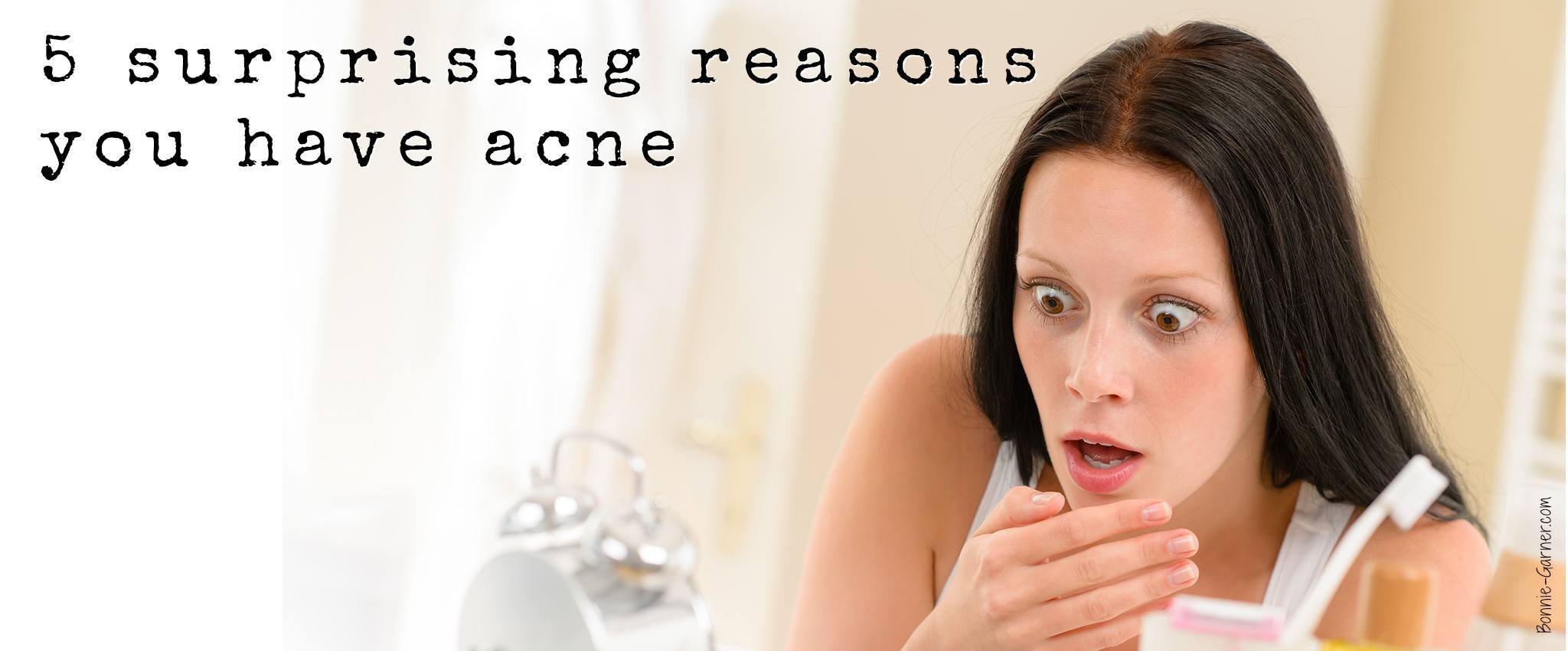Acne is unfortunately not only juvenile.
Sometimes, the most random things can cause acne’s unexpected come-back as an adult even when you are careful with hygiene.
There are several forms of acne, here are the most common:
– Hormonal acne, the most common. It’s the teenage acne, but it can also occur when there are some hormonal disturbances (stopping the pill, pregnancy…)
– Induced acne: it is caused by contact with different products (some cosmetics, as well as mineral oils and other chemicals…)
– Mechanical acne: caused by repeated friction on a particular area.
The acne process, a quick reminder:
Acne is a kind of chain reaction caused by several factors:
– a stimulation created by hormones (often) or stress (sometimes) will cause a hyper-secretion of sebum (the skin is oilier than usual, you shine like a disco ball)
– the skin becomes very thick and the sebum has difficulty to flow from the pores and some blackheads arrived (yummy)
– these two phenomena will create an environment that encourages the growth of bacteria (welcome to Staphylococci and P. Acnes party!) and hello to a beautiful cutaneous inflammation, with of course the arrival of charming red and white pimples (yes, it’s a lovely range of colours).
But some factors may be quite different.
So, here are 5 surprising reasons you have acne:
-
Your hair products:
When you have your shower, when do you wash your face? At the beginning of your shower?
I did that too. But I discovered that shampoo and conditioners can contain some ingredients that cause acne (silicone, various mineral or vegetable oils, vegetable butters which are perfect for the hair but can be comedogenic…).
My advice would be to wash your face at the end of the shower, to get rid of all hair product residues which should not be on your face anyway. Hygiene is making sure that these residues that can cause acne are properly removed from your face.
Same for hair styling products (especially for spray style products), it is best to avoid them getting on your skin… I personally protect my face with my hands during the application of these types of hair products.
During the night, I don’t sleep peacefully on my back without moving. My husband would love it if I did, but sadly I apparently move a lot, I turn around, and inevitably, I rub my face and my hair on my pillow.
A pillowcase on which we spend an average of 7-8 hours a night is going to quickly be smeared with different products: residues of hair products, cosmetic products, but also of course sebum. If you do not regularly wash your pillowcase it can quickly become a breeding ground for bacteria!
When you suffer from acne, it’s better to change it at least once a week or two. I know it’s a bit of maintenance, but your skin will thank you later.
-
Your mobile phone:
A mobile phone = a traveling nest of bacteria. We touch it all day long, it hangs at the bottom of our bag, it is placed anywhere… so imagine all the disgusting stuff it picks up along the way!
Wherever possible, I avoid pushing it up against my face (my headphones are my best friends). And a good cleaning from time to time is not a bad idea.
You can use special screen cleaners that won’t damage the screens, and have some type of antiseptic. This may well help reduce transferring of bacteria and reduce the pressure of the phone on your skin that can be aggravating and a cause of acne.
-
Hard water :
Hard water is not as good for cleaning the skin and to top it, is very hard to rinse off the skin. It will likely leave a lot of residue on the skin, which may clog the pores after a while.
The radical solution would be to use a water filter softener. It’s ideal, but it is quite expensive.
Generally, I always rinse my face again with a thermal water spray before blotting with a tissue. This allows to remove the remains of calcareous water (here in Dubai, the water is particularly hard) and at the same time, thermal water really soothes my skin. This is a trick that works even if you don’t suffer from acne! wink
-
Approximately cleansing your face:
I do not question makeup remover, but rather the way to use it.
Cleansing in the evening, for many, is a chore, and it is very tempting to do this quickly.
What’s the risk? Naughty spots can thrive on a combination of leftover makeup products, and dirt, as your face gets dirty during the day (dust, pollution particles and god knows what…).
Regardless of the product used, it is necessary that the skin be completely clean and free of anything that can clog it. If a micellar solution is the product that you use, one cotton pad is often not enough to perfectly clean your face for example, you should keep on using cotton pads until the last one is clean.
So yes, if you put a lot of makeup on your face (like I do), you may need another product/approach to remove your makeup (because you will use half a box of cotton pads a day otherwise) (and the planet will not thank you for it).
Basically, wanting your makeup to last all day and not having a suitable way of removing it isn’t going to work out well.
The objective is a clean skin at the end of the day.
I personally use long lasting makeup, and also apply a sunscreen (which is quite difficult to remove). So double cleansing is really the best solution I’ve found for a squeaky clean skin.
A cleansing oil will dissolve all my makeup products (including the waterproof ones) and also solar products, and then I use a cleansing gel to finish cleaning my skin. If you don’t use a lot of makeup, one cleansing product is enough, obviously. And just in case your speed reading this, even if you don’t wear makeup, as explained above you still should clean your face at the end of the day.
When you suffer from acne, a good hygiene is really essential, so don’t mess around with your cleansing process! wink
Do you know any other reasons that can cause acne? Feel free to share in the comments!
Photos credit: Fotolia, Galeries Lafayette, Faucets.
Cet article est aussi disponible en français: Acné: 5 causes surprenantes



